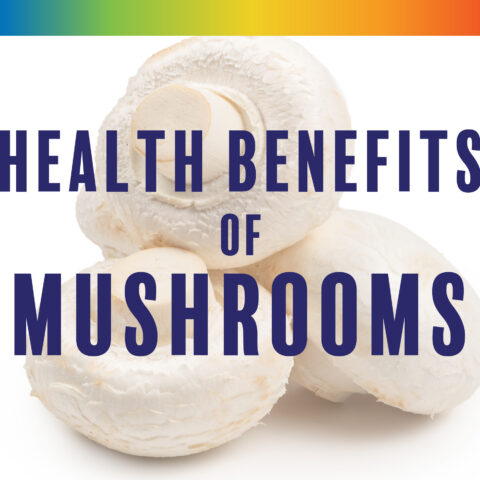Can Omega-3 Fatty Acids Help with Obesity and Metabolic Disorders?

Fish oil supplements remain one of the most popular ways to help maintain good health.[1] For years, the buzz has been that omega-3 fatty acids can help with a wide variety of conditions, ranging from preventing cognitive decline, to aiding with fat loss, and even to helping with brain and eye development.[2] And that’s just a few. There are a wide variety of other benefits to omega-3 fatty acids including good skin, aiding with sleep, and even helping with arthritis.[3]
What are omega-3 fatty acids?
Omega-3 supplements generally include two primary forms: EPA and DHA, which stand for eicosapentaenoic acid and docosahexaenoic acid respectively.[4] These are the two omega-3 fatty acids that have been studied the most, and seem to provide the most benefits.[5] Non-alcoholic fatty liver disease, for example, is the most common cause of liver disease, and both EPA and DHA can help reduce this liver fat, as well as aid with other chronic conditions.[6]
Both EPA and DHA are long chain polyunsaturated fatty acids, and appear to be crucial for reducing inflammation throughout the body.[7] The most commonly studied supplemental form is a blend of EPA to DHA, in a ratio of 18:12.[8] This is scientifically fascinating, as DHA is actually the more potent of the two omega-3 fatty acids.[9] DHA has been shown to be essential for the growth and development of our brains – which is why it’s added to almost every prenatal vitamin in the world.[10]
In fact, DHA is so important for our brain, that deficiencies have been associated with learning disabilities.[11] Similarly, cognitive decline has also been associated with a lack of DHA.[12] It’s interesting that brain deficiencies in infants – and degenerative brain diseases like Alzheimer’s – are linked by deficiencies in DHA.[13]
Biochemically, omega-3s are also interesting because they are an essential nutrient. Meaning, they are not made by the body. If you’re not eating enough wild-caught fish, or supplementing, you are likely deficient in omega-3’s.[14] Omega-3s are so crucial, that they even help build cell membranes. That’s right, our very own cells – the most basic building blocks of human life – require omega-3s.[15]
It is endlessly fascinating to me that omega-3s are not made by our body and must be obtained exogenously. For something so critical – usually our body would manufacture that sort of thing. Plant-based omega-3s come in a different form – alpha-linolenic acid – which the body has to change into DHA and EPA.[16] Because this is not a terribly efficient process, plant-based omega-3s are not recommended by me, to any of my clients.
Omega-3 fatty acids do not actually appear to contribute to weight loss. But the research does show that omega-3s help keep weight off. This is important because research has also shown that about 50 percent of weight that is lost is regained after one year.
Omega-3s help with weight loss and inflammatory conditions
When it comes to body weight and obesity, omega-3 fatty acids play an important role. Among its benefits, omega-3s seem to play a role in appetite suppression. There are also the benefits of omega-3s in increasing lean body mass and aiding with better fatty acid oxidation.[17]
Surprisingly, in obesity research, omega-3 fatty acids do not actually appear to contribute to weight loss. But the research does show that omega-3s help keep weight off.[18] They are also critical to maintaining a healthy body weight, as well as a healthy BMI. This is important because research has also shown that about 50 percent of weight that is lost is regained after one year.[19] This means that long term weight loss remains out of reach for many and every little advantage can help.
To help reduce inflammation (another key component in reducing obesity,) omega-3s block inflammation pathways, which is also why omega-3s can be beneficial for those with arthritis, and other inflammatory conditions. Omega-3s can also help reduce the level of triglycerides found within the body – another key component in improving health and reducing obesity.[20]Omega-3 fatty acids supplements may even help with depression since inflammation has been linked to depression,[21] though the research is still a bit mixed.
Alzheimer’s cannot be treated with just omega-3 fatty acids, but research has shown positive results for those who do not yet have a degenerative brain disease when supplementing with omega-3s.[22]
Since omega-3s are critical in building cell membranes – which literally protect our cells from harm – it’s easy to see how they also help protect us from other ailments.[23] Omega-3s are crucial for healthy functioning of our blood vessels, brain, lungs, eyes, heart, glands, sperm cells, and immune system.[24] Quite a laundry list of benefits – but also most critical for keeping obesity at bay.
Getting Enough Omega-3s in Your Diet
A Paleo Diet® will have a good amount of omega-3 fatty acids already present. Consuming wild-caught fish and other seafood, a key part of The Paleo Diet, will provide us with brain and heart healthy omega-3s.
However, I still recommend to clients that they take about 1000mg (or 1 g) per day, of DHA. This is because DHA has been shown to be able to retroactively convert to EPA.[25] Meaning you will get the benefits of both DHA and EPA just by taking DHA.
We know that omega-3s operate in a variety of ways to aid with obesity and the metabolic syndrome.[26] But it must be noted that nothing is a silver bullet, and a healthy diet and exercise plan remains the most critical piece of any healthy lifestyle. A Paleo Diet will provide a good amount of omega-3s, and the anti-inflammatory effects of vegetables in a Paleo approach will help aid with obesity even further.
As a final note, we cannot forget the benefits of protein, either. Protein revs up our metabolism, builds muscle, and lowers our hunger. A plain chicken breast, beats a protein powder, any day. But because omega-3s cannot be produced by our own bodies, we must eat them from food sources – and I still recommend that even the healthiest eater, supplements with around 1000mg (or 1g) of DHA.
References
[1] De magalhães JP, Müller M, Rainger GE, Steegenga W. Fish oil supplements, longevity and aging. Aging (Albany NY). 2016;8(8):1578-82.
[2] Harris WS. Fish oil supplementation: evidence for health benefits. Cleve Clin J Med. 2004;71(3):208-10, 212, 215-8 passim.
[3] Kremer JM, Lawrence DA, Petrillo GF, et al. Effects of high-dose fish oil on rheumatoid arthritis after stopping nonsteroidal antiinflammatory drugs. Clinical and immune correlates. Arthritis Rheum. 1995;38(8):1107-14.
[4] Swanson D, Block R, Mousa SA. Omega-3 fatty acids EPA and DHA: health benefits throughout life. Adv Nutr. 2012;3(1):1-7.
[5] Dyall SC. Long-chain omega-3 fatty acids and the brain: a review of the independent and shared effects of EPA, DPA and DHA. Front Aging Neurosci. 2015;7:52.
[6] Ochi E, Tsuchiya Y. Eicosapentaenoic Acid (EPA) and Docosahexaenoic Acid (DHA) in Muscle Damage and Function. Nutrients. 2018;10(5)
[7] Maroon JC, Bost JW. Omega-3 fatty acids (fish oil) as an anti-inflammatory: an alternative to nonsteroidal anti-inflammatory drugs for discogenic pain. Surg Neurol. 2006;65(4):326-31.
[8] Ghasemi fard S, Wang F, Sinclair AJ, Elliott G, Turchini GM. How does high DHA fish oil affect health? A systematic review of evidence. Crit Rev Food Sci Nutr. 2018;:1-44.
[9] Grønn M, Christensen E, Hagve TA, Christophersen BO. Peroxisomal retroconversion of docosahexaenoic acid (22:6(n-3)) to eicosapentaenoic acid (20:5(n-3)) studied in isolated rat liver cells. Biochim Biophys Acta. 1991;1081(1):85-91.
[10] Lauritzen L, Brambilla P, Mazzocchi A, Harsløf LB, Ciappolino V, Agostoni C. DHA Effects in Brain Development and Function. Nutrients. 2016;8(1)
[11] Kuratko CN, Barrett EC, Nelson EB, Salem N. The relationship of docosahexaenoic acid (DHA) with learning and behavior in healthy children: a review. Nutrients. 2013;5(7):2777-810.
[12] Weiser MJ, Butt CM, Mohajeri MH. Docosahexaenoic Acid and Cognition throughout the Lifespan. Nutrients. 2016;8(2):99.
[13] Cederholm T, Salem N, Palmblad J. ω-3 fatty acids in the prevention of cognitive decline in humans. Adv Nutr. 2013;4(6):672-6.
[14] Weylandt KH, Serini S, Chen YQ, et al. Omega-3 Polyunsaturated Fatty Acids: The Way Forward in Times of Mixed Evidence. Biomed Res Int. 2015;2015:143109.
[15] Valentine RC, Valentine DL. Omega-3 fatty acids in cellular membranes: a unified concept. Prog Lipid Res. 2004;43(5):383-402.
[16] Gerster H. Can adults adequately convert alpha-linolenic acid (18:3n-3) to eicosapentaenoic acid (20:5n-3) and docosahexaenoic acid (22:6n-3)?. Int J Vitam Nutr Res. 1998;68(3):159-73.
[17] Smith GI. The Effects of Dietary Omega-3s on Muscle Composition and Quality in Older Adults. Curr Nutr Rep. 2016;5(2):99-105.
[18] Buckley JD, Howe PR. Long-chain omega-3 polyunsaturated fatty acids may be beneficial for reducing obesity-a review. Nutrients. 2010;2(12):1212-30.
[19] Blomain ES, Dirhan DA, Valentino MA, Kim GW, Waldman SA. Mechanisms of Weight Regain following Weight Loss. ISRN Obes. 2013;2013:210524.
[20] Shearer GC, Savinova OV, Harris WS. Fish oil — how does it reduce plasma triglycerides?. Biochim Biophys Acta. 2012;1821(5):843-51.
[21] Osher Y, Belmaker RH. Omega-3 fatty acids in depression: a review of three studies. CNS Neurosci Ther. 2009;15(2):128-33.
[22] Dyall SC. Long-chain omega-3 fatty acids and the brain: a review of the independent and shared effects of EPA, DPA and DHA. Front Aging Neurosci. 2015;7:52.
[23] Surette ME. The science behind dietary omega-3 fatty acids. CMAJ. 2008;178(2):177-80.
[24] Swanson D, Block R, Mousa SA. Omega-3 fatty acids EPA and DHA: health benefits throughout life. Adv Nutr. 2012;3(1):1-7.
[25] Grønn M, Christensen E, Hagve TA, Christophersen BO. Peroxisomal retroconversion of docosahexaenoic acid (22:6(n-3)) to eicosapentaenoic acid (20:5(n-3)) studied in isolated rat liver cells. Biochim Biophys Acta. 1991;1081(1):85-91.
[26] Lorente-cebrián S, Costa AG, Navas-carretero S, Zabala M, Martínez JA, Moreno-aliaga MJ. Role of omega-3 fatty acids in obesity, metabolic syndrome, and cardiovascular diseases: a review of the evidence. J Physiol Biochem. 2013;69(3):633-51.




